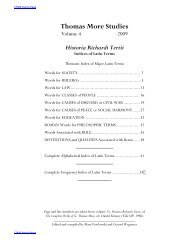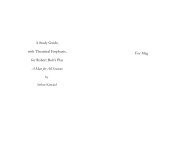life of john picus earl of mirandola - The Center for Thomas More ...
life of john picus earl of mirandola - The Center for Thomas More ...
life of john picus earl of mirandola - The Center for Thomas More ...
Create successful ePaper yourself
Turn your PDF publications into a flip-book with our unique Google optimized e-Paper software.
5<br />
10<br />
15<br />
20<br />
25<br />
30<br />
35<br />
Picus’ Commentary on Psalm 15<br />
we might yet lawfully do: showing us by that that a perfect man should<br />
abstain, not only from unlawful pleasures, but also from lawful, to the<br />
end that he may altogether wholly have his mind into heavenward and<br />
the more purely intend unto the contemplation <strong>of</strong> heavenly things.<br />
And <strong>for</strong>asmuch as some man would peradventure think that it were<br />
folly <strong>for</strong> a man utterly to deprive himself from all pleasures, there<strong>for</strong>e<br />
the prophet addeth, Dominus pars hereditatis meae–“Our Lord is the part<br />
<strong>of</strong> mine inheritance,” as though he would say: ‘Marvel not though I<br />
<strong>for</strong>sake all thing to the intent that I may have the possession <strong>of</strong> God,<br />
in Whom¦ all other things also be possessed.’ This should be the<br />
voice <strong>of</strong> every good Christian man: Dominus pars hereditatis meae–“God<br />
is the part <strong>of</strong> mine inheritance.” For ⌐ certainly ¬ we Christian people,<br />
to whom God is promised <strong>for</strong> an inheritance, ought to be ashamed<br />
to desire anything besides Him. But <strong>for</strong> that some man might haply<br />
repute it <strong>for</strong> a great presumption that a man should promise himself<br />
God <strong>for</strong> his inheritance, there<strong>for</strong>e the prophet putteth thereto, Tu es<br />
qui restitues hereditatem meam mihi–“Thou, good Lord, art He that shall<br />
restore mine inheritance unto me,” as though he would say, ‘O good<br />
Lord, my God, I know well that I am nothing in respect <strong>of</strong> <strong>The</strong>e, I<br />
wot well I am unable to ascend by mine own strength so high to have<br />
<strong>The</strong>e in possession, but Thou art He that shalt draw me to <strong>The</strong>e by<br />
Thy grace, Thou art He that shalt give Thyself in possession unto me.’<br />
Let a righteous man then consider how great a felicity it is to have God<br />
fall unto him as his inheritance.<br />
It followeth ⌐ in the psalm ¬ : Funes ceciderunt mihi in praeclaris–“<strong>The</strong><br />
cords have fallen to me nobly. 1 ” <strong>The</strong> parts and lots ⌐ <strong>of</strong> inheritances ¬<br />
were <strong>of</strong> old time meted out and divided by cords ⌐ or ropes ¬ . ⌐ <strong>The</strong>se<br />
words, then, ‘the ropes or cords have fallen to me nobly,’ be as much<br />
to say, as the part or lot <strong>of</strong> mine inheritance is noble. ¬ But <strong>for</strong>asmuch<br />
as there be many men which though they be called to this great felicity<br />
(as indeed all Christian people are) yet they set little thereby and<br />
<strong>of</strong>tentimes change it <strong>for</strong> a small simple delight, there<strong>for</strong>e the prophet<br />
saith seemingly, Hereditas mea praeclara est mihi–“Mine inheritance is<br />
noble to me, as though he would say, that as it is noble in itself so it is<br />
noble to me, ⌐ that is to say, I repute it noble, ¬ and all other things in<br />
¦10 <strong>More</strong> omits denique, “finally” (CW 1:368, 369).<br />
1. nobly: <strong>More</strong>’s translation <strong>of</strong> in praeclaris, “in pleasant places” (CW 1:242).<br />
47<br />
A perfect man should<br />
abstain, not only from<br />
unlawful pleasures, but<br />
also from lawful.<br />
[100]<br />
Cords or ropes











